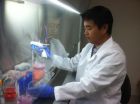(Press-News.org) Just as the body can become resistant to antibiotics, certain methods of killing cancer tumors can end up creating resistant tumor cells. But a University of Central Florida professor has found a protein present in several types of cancer, including breast and ovarian cancer, which could be helpful in preventing tumors from coming back.
The protein, KLF8, appears to protect tumor cells from drugs aimed at killing them and even aid the tumor cells' ability to regenerate.
"All cells have a DNA-repair mechanism," explained Jihe Zhao, a medical doctor and researcher who in the past few months has published several articles related to the protein in the Journal of Biological Chemistry (http://www.jbc.org/content/287/52/43720) and Oncogene (http://www.nature.com/onc/journal/vaop/ncurrent/full/onc2012545a.html), among others. "That's why we survive constant DNA damage threats. But KLF8 is overexpressed in specific cancers, such as breast cancer and ovarian cancer. The thought is that if we can stop it from switching on, we may be able to stop the tumors from coming back as part of therapy. We still need to do a lot more research, but it is plausible."
There are between 2.5 million and 2.7 million women who have breast cancer in the United States and 10 to 20 percent will experience a recurrence, according to the American Cancer Society. Current treatment options, depending on the stage of cancer, include surgical removal followed by chemotherapy using a combination of cancer killing drugs. Each year about 22,200 women are also diagnosed with ovarian cancer.
DNA damage-based chemotherapies depend on failure of cancer cells to repair the DNA damage and subsequent cell death, according to the journal article. Aberrant high levels of DNA repair function in the cells likely increase not only the resistance of the cells to such therapies but also the malignancy of the cells due to improper DNA repair-mediated genomic and chromosomal instability.
In the study, Zhao's team tested one specific cancer-fighting drug used in the treatment of breast cancer to determine the role of the protein.
"Indeed, our results have clearly linked the KLF8-promoted DNA repair to the cell resistance to doxorubicin-induced cell death," Zhao said. "It remains to be determined whether KLF8 plays a similar role in repairing DNA damage caused by other types of genotoxic agents such as DNA alkylating agents and ionizing radiation."
Even so, the results suggest that in addition to enhancing the drug resistance of the cancer cells, KLF8 could play a role in disturbing genomic integrity through its aberrant DNA repair function and subsequently contribute to aggressive progression of cancer.
INFORMATION:
Zhao, an associate professor, moved his team to UCF's Burnett School of Biomedical Sciences at the College of Medicine in 2010. Previously he was at Albany Medical College as an assistant professor and before that he spent six years in post-doctoral training in Cornell University, Ithaca, N.Y. He earned his M.D. from Chinese Medical University, Shenyang, China, and Ph.D. in cancer cell biology from Tohoku University Faculty of Medicine, Sendai, Japan. He sits on the editorial boards of several peer-reviewed journals related to cancer research and reviews research articles for many prestigious journals including Cancer Research, Oncogene, Molecular Cell, Nanomedicine, and Journal of Biological Chemistry, to name a few. His research programs are funded by National Cancer Institute of National Institute of Health, American Cancer Society, Susan Komen for the Cure Breast Cancer Foundation, and others.
50 Years of Achievement: The University of Central Florida, the nation's second-largest university with nearly 60,000 students, is celebrating its 50th anniversary in 2013. UCF has grown in size, quality, diversity and reputation, and today the university offers more than 200 degree programs at its main campus in Orlando and more than a dozen other locations. Known as America's leading partnership university, UCF is an economic engine attracting and supporting industries vital to the region's success now and into the future. For more information, visit http://today.ucf.edu.
DNA-repairing protein may be key to preventing recurrence of some cancers
2013-01-28
ELSE PRESS RELEASES FROM THIS DATE:
Global research team decodes genome sequence of 90 chickpea lines
2013-01-28
Hyderabad, India, and Shenzhen, China (28 January 2013) – In a scientific breakthrough that promises improved grain yields and quality, greater drought tolerance and disease resistance, and enhanced genetic diversity, a global research team has completed high-quality sequencing of not one but ninety genomes of chickpea.
Nature Biotechnology, the highest ranked journal in the area of biotechnology, featured the reference genome of the CDC Frontier chickpea variety and genome sequence of 90 cultivated and wild genotypes from 10 different countries, as an online publication ...
Radial access should be first choice for PCI says ESC
2013-01-28
Sophia Antipolis, 28 January 2013: The radial approach for percutaneous coronary interventions (PCI) was developed 20 years ago and is used for more than 50% of procedures in France, Scandinavian countries, the UK, Spain and Italy. Despite the advantages of radial access some countries in Europe such as Germany use radial access for fewer than 10% of PCI.
Evidence has accumulated in the literature showing the benefits of radial over femoral access for PCI including reduced bleeding and improved survival. In addition, the development of smaller and thinner devices has ...
New technique sheds light on RNA
2013-01-28
ANN ARBOR, Mich. — When researchers sequence the RNA of cancer cells, they can compare it to normal cells and see where there is more RNA. That can help lead them to the gene or protein that might be triggering the cancer.
But other than spotting a few known instigators, what does it mean? Is there more RNA because it's synthesizing too quickly or because it's not degrading fast enough? What part of the biological equilibrium is off?
After more than a decade of work, researchers at the University of Michigan Comprehensive Cancer Center have developed a technique to ...
Study finds energy use in cities has global climate effects
2013-01-28
TALLAHASSEE, Fla. ⎯ The heat generated by everyday energy consumption in metropolitan areas is significant enough to influence the character of major atmospheric circulation systems, including the jet stream during winter months, and cause continental-scale surface warming in high latitudes, according to a trio of climate researchers that includes Ming Cai, a professor in Florida State University's Department of Meteorology.
Led by Guang Zhang, a research meteorologist at Scripps Institution of Oceanography at the University of California, San Diego, the scientists ...
University of Tennessee researcher finds 'first time' could predict sexual satisfaction
2013-01-28
Research conducted by Matthew Shaffer, a doctoral psychology student at UT and C. Veronica Smith, an assistant psychology professor at the University of Mississippi, reveals that the first sexual experience can set the tone for the rest of one's sexual life.
The study is published in the Journal of Sex and Marital Therapy and is the first to look at whether the circumstances of losing one's virginity have lasting consequences.
"The loss of virginity is often viewed as an important milestone in human development, signifying a transition to adulthood," said Shaffer. ...
Majority of Americans support dozens of policies to strengthen US gun laws
2013-01-28
The majority of Americans support a broad array of policies to reduce gun violence, according to a new national public opinion survey conducted by researchers at the Johns Hopkins Bloomberg School of Public Health. These policies include: requiring universal background checks for all gun sales (supported by 89 percent); banning the sale of military-style semiautomatic assault weapons (69 percent); banning the sale of large-capacity ammunition magazines (68 percent); and prohibiting high-risk individuals from having guns, including those convicted of a serious crime as a ...
Phone and mailed interventions significantly increase colorectal cancer screening rates
2013-01-28
PHILADELPHIA—A mailing or phone call to help patients get screened for colorectal cancer significantly increases their chances of actually getting tested, according to a study published in the January issue of Cancer Epidemiology, Biomarkers and Prevention by researchers at the Kimmel Cancer Center at Jefferson.
The research team, led by Ronald E. Myers, Ph.D., Professor and Director of Division of Population Science, Department of Medical Oncology at Thomas Jefferson University, performed a randomized, controlled trial of 945 people aged 50-79 to test the impact of a ...
Stanford researchers break million-core supercomputer barrier
2013-01-28
Stanford Engineering's Center for Turbulence Research (CTR) has set a new record in computational science by successfully using a supercomputer with more than one million computing cores to solve a complex fluid dynamics problem—the prediction of noise generated by a supersonic jet engine.
Joseph Nichols, a research associate in the center, worked on the newly installed Sequoia IBM Bluegene/Q system at Lawrence Livermore National Laboratories (LLNL) funded by the Advanced Simulation and Computing (ASC) Program of the National Nuclear Security Administration (NNSA). Sequoia ...
Smart organizations should also be stupid according to new theory
2013-01-28
"We see functional stupidity as the absence of critical reflection. It is a state of unity and consensus that makes employees in an organisation avoid questioning decisions, structures and visions", says Mats Alvesson. "Paradoxically, this sometimes helps to raise productivity in an organisation."
Together with colleague André Spicer, Mats Alvesson has written an article entitled 'A Stupidity-Based Theory of Organisations', which was recently published in the renowned Journal of Management Studies and has been featured in the Financial Times. In the article, he expounds ...
Progressive optics for side mirrors ends automobile blind spots without distorting view
2013-01-28
WASHINGTON, Jan. 28, 2013—A new optical prescription for automobile side-view mirrors may eliminate the dreaded "blind spot" in traffic without distorting the perceived distance of cars approaching from behind. As described in a paper published today in the Optical Society's (OSA) journal Optics Letters, objects viewed in a mirror using the new design appear larger than in traditional side-view mirrors, so it's easier to judge their following distance and speed.
Today's motor vehicles in the United States use two different types of mirrors for the driver and passenger ...



